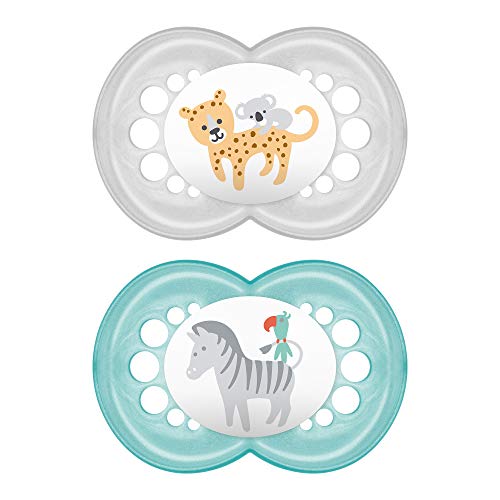- Features
- Description
- Similar Items
CALMS & SOOTHES BABIES 16+ MONTHS: Our MAM pacifier nipple is designed by parents and medical experts to feel like mother's breast to relax babies 16 months and older.
EASY CLEANING & CARRYING: MAM pacifiers sterilize in the microwave in the case they come with in 3 minutes, perfect for travel and on the go. Case is reusable and perfect for keeping your MAM pacifiers clean.
ALWAYS RIGHT-SIDE UP: Symmetrical nipple so newborn pacifier can never be inserted incorrectly. Other newborn pacifiers require manual adjustment and can harm oral development if positioned incorrectly.
DESIGNED TO PREVENT SKIN IRRITATION: MAM Pacifiers feature large air holes to allow air to reach baby's skin to reduce irritation. Curved shield and innovative bumps on inner shield surface prevent pacifier from laying completely flush to baby's face.
PREMIUM EUROPEAN MATERIALS: Made in Europe from high quality, 100% baby safe BPA & BPS free materials. MAM pacifiers and all MAM products meet or exceed both U.S. & European safety standards.
EASY CLEANING & CARRYING: MAM pacifiers sterilize in the microwave in the case they come with in 3 minutes, perfect for travel and on the go. Case is reusable and perfect for keeping your MAM pacifiers clean.
ALWAYS RIGHT-SIDE UP: Symmetrical nipple so newborn pacifier can never be inserted incorrectly. Other newborn pacifiers require manual adjustment and can harm oral development if positioned incorrectly.
DESIGNED TO PREVENT SKIN IRRITATION: MAM Pacifiers feature large air holes to allow air to reach baby's skin to reduce irritation. Curved shield and innovative bumps on inner shield surface prevent pacifier from laying completely flush to baby's face.
PREMIUM EUROPEAN MATERIALS: Made in Europe from high quality, 100% baby safe BPA & BPS free materials. MAM pacifiers and all MAM products meet or exceed both U.S. & European safety standards.
Binding:
Baby ProductBrand:
MAMEAN:
0845296038944Label:
AmazonUs/MAMAMManufacturer:
AmazonUs/MAMAMModel:
3894-012-0-1Size:
Warranty:
MAM pacifiers 16+ months are ideal for babies 16 months and older and the best baby pacifier for breastfed babies. Their Skin Soft nipples are perfectly sized for babies 16 months and older and are designed with parents and medical experts to closely resemble the breast for easy acceptance and a natural feel. In fact, 94% of babies accept the MAM Skin Soft nipple! Both parents and babies can relax with MAM pacifiers since they are especially designed to comfort baby while promoting proper oral development. Market research 2009-2017 with 1, 508 babies.






